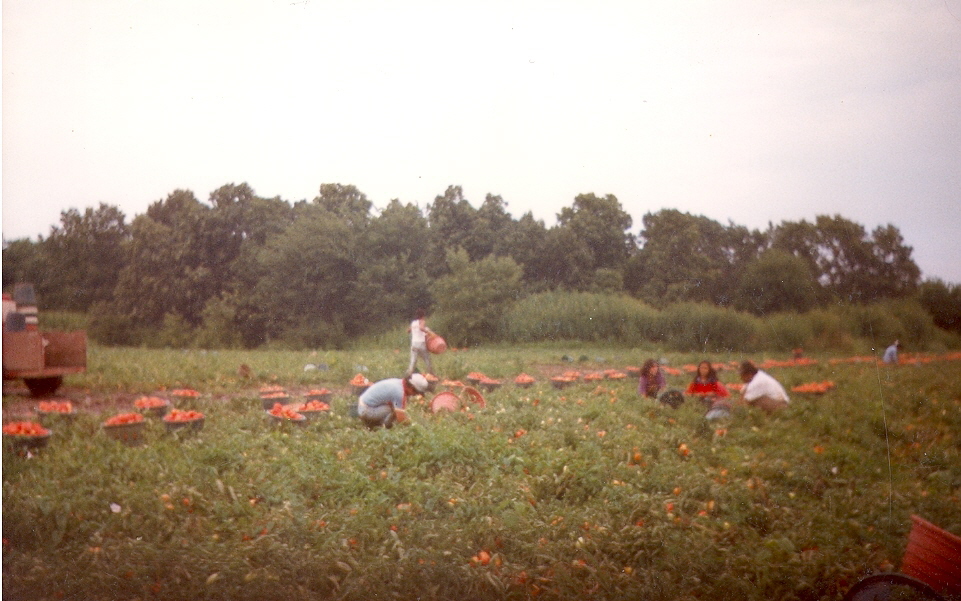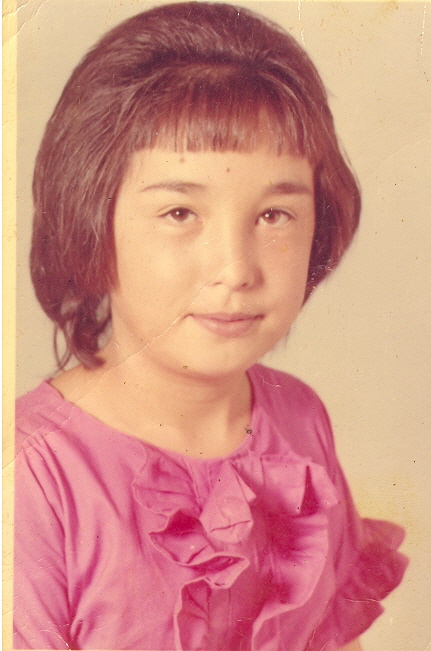TRANSCRIPTION
What are your earliest childhood memories?
My favorite time about up north is when we finished working. My father would be talking to us about his younger days, my mom and sister would be making food while we were outside talking and resting. Dad liked telling us old stories from when he was young, sometimes he would repeat them, but we enjoyed hearing them. Growing up we didn't have enough money, she couldn't buy us candy or sweets like other children had, so she would make us her own kind of sweetbread. She would knead some dough and put cinnamon and sugar and who knows what else, and then bake it in the oven. When it came out of the oven it was the best sweetbread I have ever tasted, we were poor, but we didn't care, it was good. Another favorite of mine was when mom would make tortillas on the grill. She would toast them a little bit and put a slice of cheddar cheese in the middle, then sprinkle sugar on the cheese, fold it like a taco and that was good too.


As a child, how did your chores compare to those of your brothers and sisters?
The boys would have to work on the trucks if they broke down, the girls took turns helping mom with the cooking, washing clothes, cleaning house, making beds and other house chores and we had to get it done before we even went to work because mom didn't want to come home from working on the fields to a dirty house. In Minnesota, we worked on the fields and my younger brothers and sisters, who were too young to help, stayed in the truck and slept while we worked in the early morning hours. Girls were in charge of housework; the boys took care of the truck and made sure it was always in good condition. They also did all the loading of the truck, when we went to Muscatine, Iowa they were responsible for loading the truck with the tomatoes.
How did you and your family travel for work?
In my father's big red truck, Ford 350 almost like a trailer, we packed the back of the truck with everything we needed, in the front was mom, dad, and my oldest sister and everyone else was in the back. Way back then the blue jean factory would give us big barrel cans and we used to put all our clothing in there. We put mattresses on top of the barrels and that's where we slept. The trips took us two days traveling and my father would drive nonstop, my mom and sister who were in the front would keep giving him coffee and wet towels for his eyes so he wouldn't sleep.

Do you think migrant work has affected your health today?
Yes, I think it has affected us in our health. Out of eight girls, five of us had to have hysterectomies three of the eight have had miscarriages. I think it was the pesticides and insecticides that were sprayed while we were working. They told us it wouldn't affect us, so we just went on picking while getting wet with the medicine being sprayed from planes. We used to hate the smell of the insecticides, but after a while, we got used to it. My daughter and my niece have even had hysterectomies. My niece was trying to have children and was unable to because of the cyst she had. They told her she had to get them removed first. After just three operations, they removed about a hundred cysts. They told her she had to have a hysterectomy. My daughter, too, because of the cyst that had formed in Sandra (her daughter) when she was pregnant, her daughter was born with a problem with development of her one of her feet. I think all of this was because of the chemicals we breathed and absorbed through our skin all those years.
How did migrant work affect you and school?
We missed whole semesters of school, so our grades for the semesters we returned for were F's and that's why I couldn't graduate. It was hard for me to make up the work we missed and we needed income for the family. So me and my older sister did not finish school. Everyone else got to graduate from high school, but we were the oldest and had to help support the family.
Where would you stay when you arrived on the fields?
In Minnesota we stayed in a house without any inside walls, you know how the boards are on the outside, no sheet rock or anything. We were lucky it wasn't cold, there was no insulation to keep us warm. There was a ceiling, no restroom, we used outhouses. We didn't have a kitchen either. We had a stove and a refrigerator but we didn't have a sink. In Muscatine Iowa where we picked tomatoes all thirteen of us stayed in a garage. For a couple months we all stayed in that one room with bunkbeds all around the walls. We worked at different fields. In a week or so we could finish one field then we would go to the next after that. We hoed the sugarbeets, picked the tomatoes, and took the weeds out from the wheat.

What did you do for fun during your adolescent years?
Me, my brothers and sisters, about once a month, we would go to the movies. Dad would take us in the big truck and open the back door and we would all get in and we would be able to go, we would go to the movies. We used to go to dances and we used to dance. One time there was this Mexican dance going on and we were all gonna go, Fina, Lile, Theresa, Julia, Susie, it was about seven of us including our cousins. We would get ready and get dressed and mom would always find a way to make us dresses and we would always have something nice to wear. I don't know how mother did it, but she did it. Anyways, we went to the dance and there was this guy playing, very cute, he was playing in the band and my cousin Lile was sitting there saying "Oh he's looking at me, he is going to come and talk to me" and I was just sitting there next to her and i love to see people dance. I really love to see people dance, so I wasn't even paying attention to her. Then we see the guy ask someone else to play to the drums for him and he starts walking toward where we are sitting. My cousin thought he was going to come talk to her and ask her to dance, she was all nervous. He was walking and came up to us and came up to me and asked me to dance. Lile got so mad, so mad at me. But I danced with him and we talked a lot and we had so much fun dancing and talking that he told me not to leave until he got my number. Well it was time for us to leave and Lile was calling us to hurry up because it was time. I didn't give him my number and Lile ended up not talking to me for a whole week. And years after that she always used to say that she was gonna get me back and take Carlos (her ex-husband) away from me. I said go ahead. (...laughs)

What type of work did you do when you came back to San Antonio?
Me, my sister Susie, and my mom all went and worked at Finesilver Sewing Warehouse, I sewed pants, dresses and different clothing, it was alright.

Is there anything else you would like to add to this interview?
We didn't have much money, getting by was hard work and our life was simple but we were content and happy.

